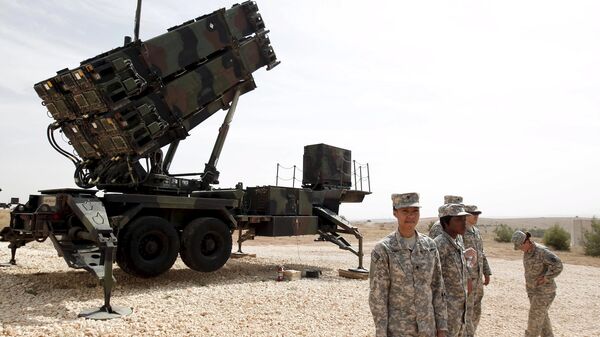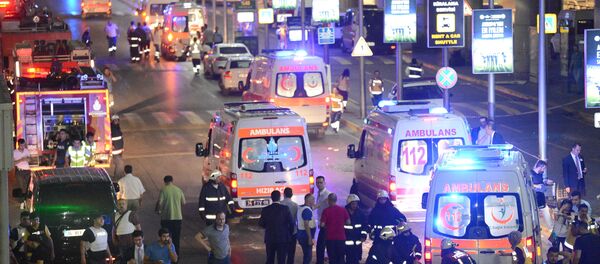WASHINGTON (Sputnik) – NATO has been deploying Patriot missiles in Turkey under the pretext of a "non-existent" threat of missile attacks from Syria, Russian Ambassador to NATO Alexander Grushko told Sputnik on Thursday.
On Monday, Kremlin spokesman Dmitry Peskov said that Turkish President Recep Tayyip Erdogan in a letter addressed to Russian leader Vladimir Putin apologized over the downing of a Russian Su-24 attack aircraft by a Turkish jet and extended condolences to the family of the pilot killed in the incident.
"That is what's driving the United States and NATO to try and escalate and militarize… [and] to prevent any attempts by the Turkish government from having a legitimate rapprochement with Moscow," geopolitical analyst and StopImperialism.org editor Eric Draitser told Sputnik on Thursday.
The United States and NATO were using Turkey as their frontline in the "on again, off again" new Cold War against Russia, Draitser said.
Meanwhile, recent signs indicated that Turkey might want to return to their previous status as a "nonaligned" NATO member, which Washington had resisted because they wanted Ankara to be a compliant ally, he added.
"Turkey is perfectly positioned to play both sides of the ongoing East-West conflict," Draitser said. "But it can’t do that unless it warms relations with Russia."
St. John’s University Professor of Government David Kearn told Sputnik that Erdogan is one of the most difficult leaders to read especially given his "discombobulated," foreign policy.
"The double game of allowing a pipeline of European volunteers into Syria to fight for ISIS [Daesh, outlawed in both Russia and the United States] and also being in the anti-ISIS coalition has clearly backfired, which was entirely foreseeable," Kearn said.
The mending of relations between Russia and Turkey "was a long time coming," Kearn added, albeit the recent terrorist attack at the Ataturk international airport in the largest Turkey's city of Istanbul would likely spark greater support for Ankara and might even serve to reinforce NATO unity.
As far as the rationale behind NATO’s deployment of Patriot systems in Turkey, there are legitimate reasons why Ankara might want to strengthen its defense shield, Kearn said.
"I wouldn't dismiss the threat [from Syria] out of hand… Syria is still thought to possess approximately 100 road mobile SRBMs [short-range ballistic missiles] mostly based on older SCUD models," he added.
Woodrow Wilson Center scholar Michael Kofman told Sputnik that it was inevitable that Russia and Turkey would reach a compromise that would allow both countries, and more importantly their leaders, to save face regarding the downing of the Russian jet.
"The political fallout was quite costly for both sides [Turkey and Russia]," Kofman said. "I suspect the previous degree of cooperation and trust will not be restored."
On Thursday, Russia's Ambassador to Syria Alexander Kinshchak said if Moscow and Ankara agreed on a common approach to fight terrorism as part of the rapprochement, Turkey would close its border with Syria.


